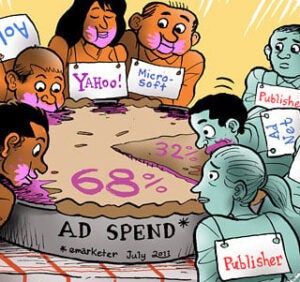 Beijing-based Miteno Communication Technology is buying contextual ad network Media.net for $900 million in cash.In other words, a Chinese consortium led by a company you’ve most likely never heard of just spent almost $1 billion to acquire an ad tech company you’ve also probably never heard of.
Beijing-based Miteno Communication Technology is buying contextual ad network Media.net for $900 million in cash.In other words, a Chinese consortium led by a company you’ve most likely never heard of just spent almost $1 billion to acquire an ad tech company you’ve also probably never heard of.
It’s a trend we’re going to see more of, said Terence Kawaja, CEO and founder of LUMA Partners, which has worked with Media.net as an adviser for years.
“We can expect more scaled acquisitions of profitable companies by Chinese concerns that are not exactly household names,” Kawaja said.
And that’s because deep-pocketed Chinese companies with legacy businesses have their eye on digital-fueled growth, both at home and abroad.
That’s Miteno’s vision in a nutshell.
“Outside of their continued expansion in the US and EU, we will use our China relationships and expertise to help [Media.net] become successful in China,” said Miteno Chairman Zhiyong Zhang. “We have deep relationships with all three telecom companies in China, and they are looking for solutions that will help with defining and implementing their digital advertising strategy.”
Telcos looking to monetize – sounds familiar. Boatloads of cash are being expended with that goal in mind, from Telenor’s $360 million acquisition of Tapad to Verizon’s one-two punch acquisitions of AOL for $4.4 billion followed by Yahoo for $4.8 billion.
But what is Media.net exactly?
Short answer: It’s a contextual ad network. Media.net manages around $450 million in annual ad revenue through its platform, roughly half of which it claims is mobile, for brand-name publishers like Forbes, The New York Times, Hearst and Meredith, and for medium- and long-tail sites.
And for roughly the past eight years, Yahoo has used Media.net to power the back end of its Yahoo Bing Network Contextual Ads program. (According to Josh Cobb, Yahoo’s VP of global partnerships, Yahoo plans on “continuing the partnership and making it even stronger.”)
Media.net is bit “like the AdSense of Yahoo,” said AdSense co-founder Eytan Elbaz, who first met Media.net CEO and founder Divyank Turakhia when the latter was a teenager and Google, which had acquired AdSense, was doing a deal with Directi, the Internet domain registrar company Divyank founded with his brother Bhavin in 1998.
AdExchanger Daily
Get our editors’ roundup delivered to your inbox every weekday.
Daily Roundup
“Yahoo never matched AdSense’s technology, so they went with another vendor to outsource that capability,” Elbaz said. “Media.net has quietly and aggressively been doing its business for years. For those of us in the industry who know them, there’s zero surprise that this China acquisition is happening, but I’m sure many other folks are going to look at the name Media.net and then look at the deal price and then look back at the name and say, ‘Who are these guys?’”
Divyank Turakhia acknowledged that Media.net “sucks at marketing.”
“We’re one of the largest ad tech companies out there,” he said. “And at the same time, clearly no one other than our customers seem to know about us.”
Media.net has a headcount of 800 – up from 650 last December – which Turakhia plans to increase to 900 by the end of the year. The majority of its employees are based in India where the labor is cheaper, and that helps the company stay operationally efficient and profitable. Media.net reported just over $231 million in revenue last year.
Despite being big and in the black, Media.net has flown under the radar until now, but its $900 sale tag is about to bring it – and Miteno – a lot of attention. There’s no doubt that ad tech companies casting about for an exit are going to sit up and take notice. But China’s deep pockets won’t be a panacea for companies with commoditized offerings.
“There is a lot of smart money in China that will chase the right deals to unlock long-term value [and] I believe China has a long-term trend of outbound investments, but at the same time we want to see real businesses with real consistent growth and opportunity,” Zhang said. “Many ad tech companies should not even exist – [a lot] of companies in this space received funding which is dried up for good reason.”
But for others, the money is flowing. A group of Chinese companies bought Opera Software’s browser business for $600 million in July after a proposed $1.2 billion deal for the whole shebang, including Opera Mediaworks, fell through. In June, mobile SSP Smaato was snapped up by an offline marketing services provider based in Beijing for $148 million. And in February, Chinese mobile ad platform Mobvista acquired app monetization company NativeX for $25 million.
The Media.net deal is by far the biggest, though.
“This is the sexiest deal and the unsexiest deal in M&A,” Kawaja said. “It’s unsexy because Media.net is a company that provides the operating back end for Microsoft and Yahoo – but what’s super-sexy about it is that $900 million dollars.’














